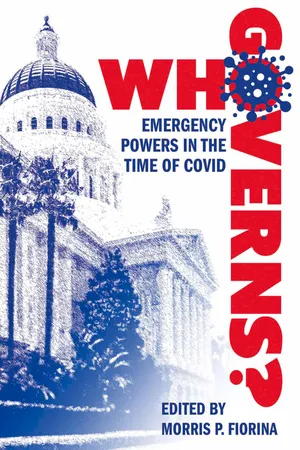
- 314 pages
- English
- ePUB (mobile friendly)
- Available on iOS & Android
About this book
In a democracy, the legitimacy of authority derives from the consent of the governed. Constitutions or long-standing norms typically impose constraints on government authority, but under extraordinary circumstances—emergencies—normal and procedural standards can be overridden or suspended. Such was the case when the COVID-19 pandemic erupted in the spring of 2020. This book describes the emergency powers that existed in the American states at the start of the pandemic; shows how such powers were implemented; examines how courts, legislatures, and public opinion responded to the use of emergency powers; and considers the resulting tensions they exert on democratic governance.
Contributors provide a background on the legal justification for emergency powers and offer summaries of the executive orders that were in effect as of mid-2020 across the United States and its territories, with special attention paid to California and Texas. They also review public attitudes about the dangers of the coronavirus and appropriate responses to it, and raise further questions about emergency powers and democratic governance—questions that deserve serious consideration before the next emergency prompts another exercise of such powers.
Frequently asked questions
- Essential is ideal for learners and professionals who enjoy exploring a wide range of subjects. Access the Essential Library with 800,000+ trusted titles and best-sellers across business, personal growth, and the humanities. Includes unlimited reading time and Standard Read Aloud voice.
- Complete: Perfect for advanced learners and researchers needing full, unrestricted access. Unlock 1.4M+ books across hundreds of subjects, including academic and specialized titles. The Complete Plan also includes advanced features like Premium Read Aloud and Research Assistant.
Please note we cannot support devices running on iOS 13 and Android 7 or earlier. Learn more about using the app.
Information
Table of contents
- Cover
- Advance Praise for Who Governs?
- Title Page
- Copyright
- Contents
- Preface
- Part I: State Emergency Powers
- Part II: Emergency Powers in Practice
- Part III: Response to the Exercise of Emergency Powers
- About the Contributors
- Index